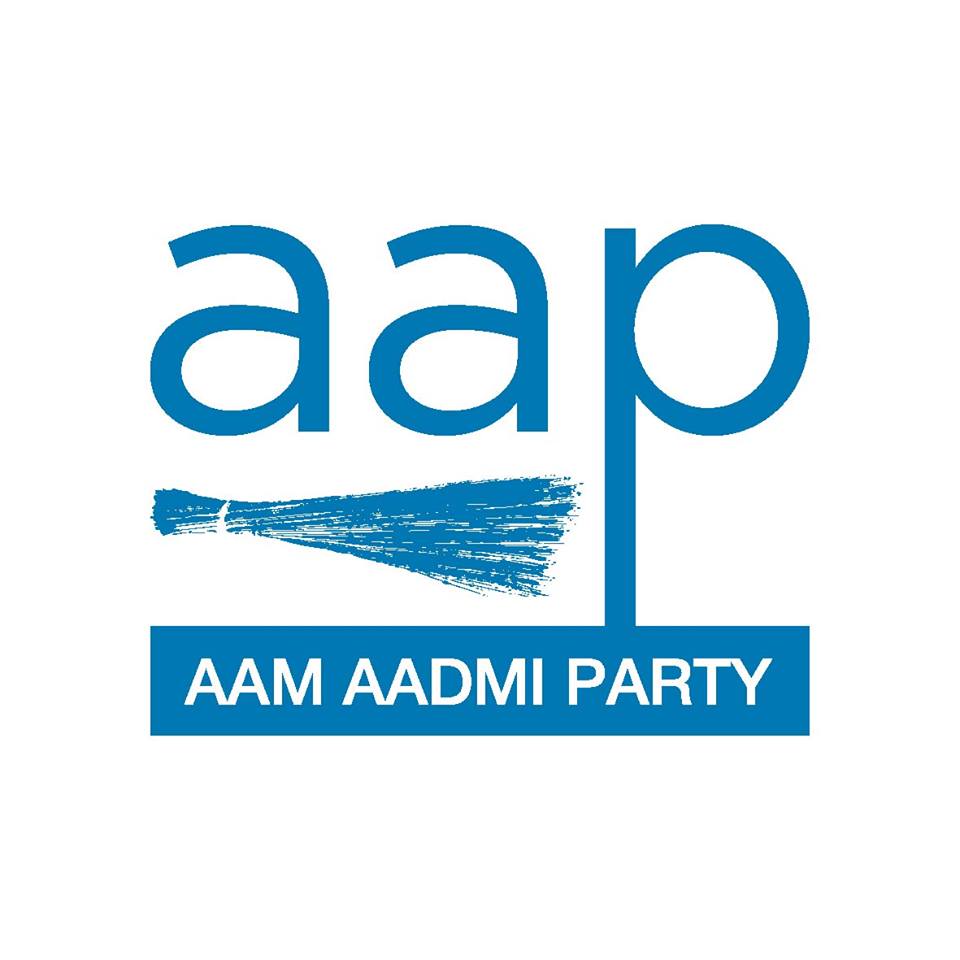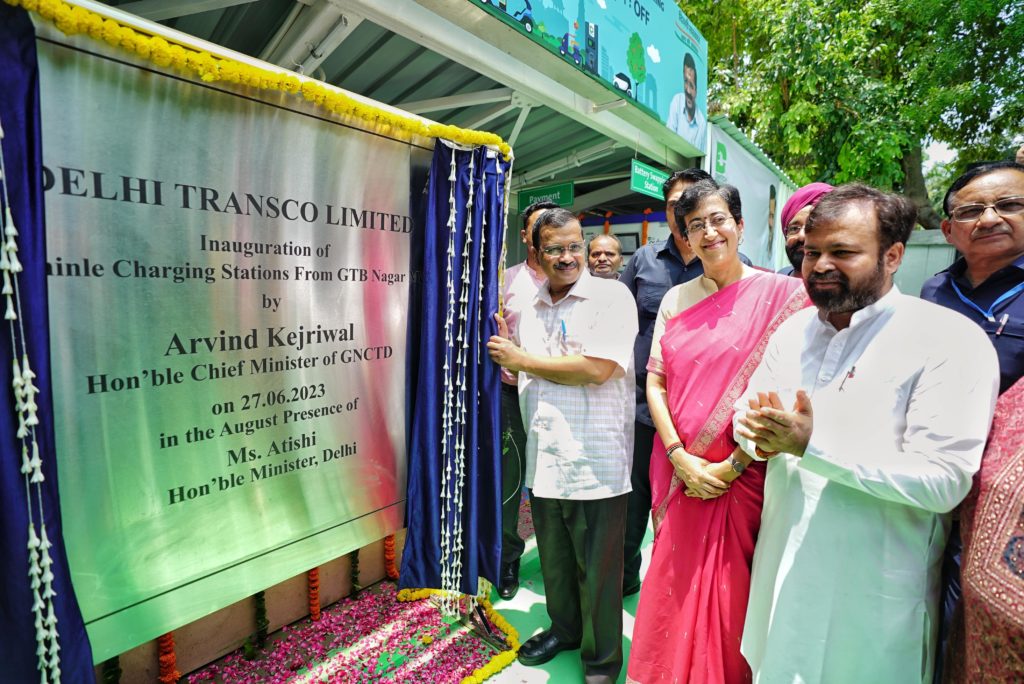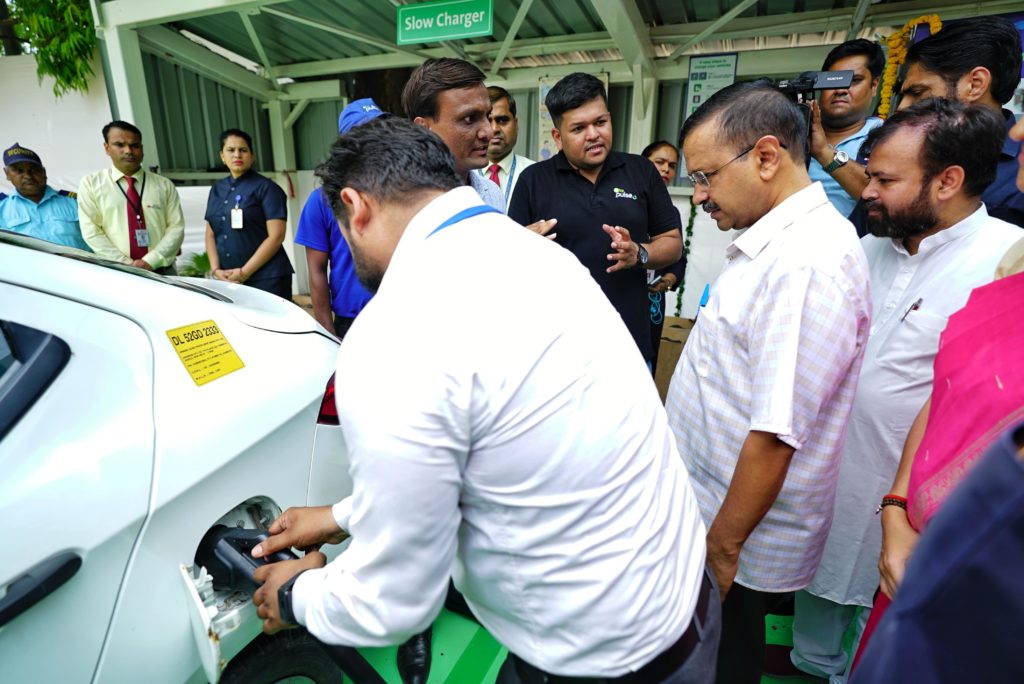In a major boost for the users of Electric Vehicles in Delhi, Chief Minister Shri Arvind Kejriwal on Tuesday launched 140 new public charging points and 48 battery swapping stations in the city. At an event held at GTB Nagar on Tuesday, the Delhi CM launched 42 new ultra low-cost charging stations across the city where these facilities will be provided to the citizens of Delhi. Power Minister Ms Atishi, Model Town MLA Shri Akhilesh Pati Tripathi and senior officials of Delhi Transco Limited (DTL) and DMRC were also present at the occasion.
During the inauguration, CM Shri Arvind Kejriwal pointed out the stark contrast in the cost of commuting between traditional fossil fuel vehicles and EVs. While driving a petrol scooter costs approximately Rs 1.75 per kilometre, an EV scooter’s cost is merely 7 paise per kilometre. Similarly, a petrol car costs Rs 7 per kilometre, whereas an EV car only costs 36 paise per kilometre. These figures highlight the substantial savings that EV owners can enjoy while contributing to a greener and cleaner Delhi. With the addition of these 42 ultra low-cost charging stations, Delhi now boasts a total of 53 locations equipped with cutting-edge EV charging infrastructure. The city offers a remarkable 4,646 charging points, along with 250 battery swapping stations, ensuring convenient access for EV users throughout the capital. CM Shri Arvind Kejriwal also proudly declared that Delhi’s EV charging network is among the most extensive in the country on this occasion.
He acknowledged the commendation received for Delhi’s EV policy, with NITI Aayog recognising it as the best in the country. The Chief Minister said that Delhi is leading the way towards a future dominated by EVs, showcasing rapid progress in aligning with global sustainability goals. Reiterating the objectives set forth in the EV policy introduced in 2020, CM Shri Arvind Kejriwal highlighted that the initial target was to achieve a 25 percent EV adoption rate. Delhi has made significant strides, with 13 percent of total vehicle sales in the city now comprising EVs, surpassing the national average of 6 percent. The success of Delhi’s EV policy can be attributed to several factors, including substantial subsidies, an extensive charging station network, low charging fees, and the active participation of Delhiites. CM Shri Arvind Kejriwal expressed his gratitude to the residents for their support and collaboration, which have played a pivotal role in realising the vision of a sustainable and eco-friendly Delhi.
Speaking at the event, Shri Arvind Kejriwal pointed out that with the addition of these 42 charging stations, the city now has a total of 53 ultra low-cost EV charging stations. He said that with an increase in the number of EVs in Delhi in recent years, the air pollution has also been on the decline. “The EV policy that had been formulated for Delhi is moving on at a rapid pace. We are all aware that air pollution is a problem in Delhi. Since our government came to power in 2015, we have been able to do excellent work in several areas such as education, healthcare, electricity and so on. But today I am happy to say that since 2015, along with the 2 crore citizens of Delhi, the state government has been consistently working in the field of air pollution, and now the results for it are also beginning to show. I am not the only one saying it, but data shows that as compared to 2014, the levels of PM 2.5 and PM 10 are lower by 30 percent. Earlier in the year, we had several days where the AQI was in the severe category, these were days with very high pollution levels. But now there are hardly any such days. But on an average, we can confidently say that the quality of air in Delhi is better than what it was a couple of years ago,” he said.
The Delhi CM said that besides curbing air pollution, the EV policy was formulated by the state government as the “future belongs to the electric vehicles”. “Several steps have been taken by the state government for this improvement in air quality. One of the key steps in this direction was the Electric Vehicle Policy. There were two key reasons for introducing it. The first was that this would help decrease pollution from emissions. The second was that the future does not belong to petrol or diesel vehicles, but the future belongs to EVs,” he said.
Shri Arvind Kejriwal added that Delhi has in the last three years gone on to become the ‘EV Capital of India’. “Therefore in August 2020 we first introduced the Electric Policy. At that time our target was that by 2025 at least 25 percent of all the new vehicles that are bought in Delhi should be EVs. This was our five-year target, and I am very happy to say that as of now 13 percent of all the new vehicles that are bought in Delhi are EVs. The national average at the moment is 6 percent. In pure numbers from August 2020 until now 1.28 lakh EV have been purchased in Delhi. It is because of the progress in this direction made by the state government and the citizens of Delhi that the national capital is now also referred to as the ‘EV Capital of India’. The maximum number of EVs in the country are being bought in Delhi,” he said.
Shri Arvind Kejriwal highlighted that a report of the Niti Aayog has urged other states across the country to take a cue from Delhi. “It does not feel good if we praise our own work. But the Niti Aayog has said that the EV Policy of Delhi is the best in the country, and it has urged the other state governments to look into the policy formulated by the Delhi Government. The EV Policy of Delhi is now also being considered amongst the best across the world, and it is being compared with those in California and New York,” he said.
The Delhi CM listed out some of the reasons behind the success of Delhi’s Electric Vehicle Policy. “I believe that there are four key elements of this policy that have made it so successful. The first element is the subsidy provided by the state government. Electric Vehicles are a little more costly as compared to other vehicles, and therefore the state government provides subsidies on it, so that it can be a little more affordable for the public. The second aspect is electric charging stations. The Delhi Government has established a network of charging stations across the city. Because whenever anyone buys an EV, their main concern is whether they’ll be able to reach a charging station when required. No one would want to get stranded. So, it was clear that until a network of charging stations was created, this policy would not be successful,” he said.
He added, “The third aspect is the rate or the cost per unit. It costs 7 paise per kilometre to run an EV scooter in Delhi. When a scooter is run using petrol it costs Rs 1.75 per kilometre. There is no comparison between the two. In the case of the EV scooter, it almost feels like you are travelling for free. When it comes to three-wheelers, a CNG vehicle costs Rs 2.60 per kilometre, but an EV three-wheeler costs 9 paise or Rs 0.09 per kilometre. In the case of a four-wheeler, a car running on petrol costs Rs 7 per kilometre, but an EV car costs Rs 0.36 per kilometre.”
Shri Arvind Kejriwal said that it was very heartening to see the people of Delhi come out actively and support the EV Policy of the state government. “The fourth reason for the successful implementation of this policy is the support of the citizens of Delhi. The way the people have lapped up this policy, it is very heartening. In a way, this has become a jan-andolan. The people are leaving behind their old cars to go and purchase new EVs. The maximum number of people in Delhi now prefer to have an electric vehicle,” he said.
The Delhi CM said that one of the key reasons behind the success of this policy was the network of electric charging stations that have been laid in Delhi. “Why has this policy been so successful in Delhi? This is because the maximum number of charging stations are located here. Delhi has one-third of the total number of electric charging stations in the country. There are 4, 646 charging points and 250 battery swapping stations. There are several charging stations that have been built with the support of RWAs, private individuals, businessmen or DTL. Everyone has come out and participated actively in this movement. The PPP model formulated by the Transport Department, Power Department and Delhi Dialogue Commission has been very successful,” he said.
He added, “If we look into the electric consumption of all the EVs across the country, as much as 55 percent of this takes place in Delhi alone. So, this means that more than half the Electric Vehicles that are running across the country run in and around Delhi. Like I mentioned earlier, the rates of charging in Delhi are the lowest as well.”
Shri Arvind Kejriwal concluded, “This is what has made this policy so successful and it is considered to be amongst the best in the world. So, after making its name in the field of education, healthcare, electricity and water supply, Delhi has also now made its name in the field of EVs. When we had said that we will provide free electricity and 24 hours electricity in Delhi, no one believed us. But if you look at Delhi’s neighbourhood now, in Noida, Gurgaon, Faridabad, there are massive power cuts there at the moment. But in Delhi we have been able to provide free electricity and 24 hour electricity.”
On this occasion, Power Minister Ms Atishi said that people living in Delhi had been troubled by pollution for years, and that has surely started changing because of the Delhi Govt’s efforts. “Especially during certain months of the year when pollution levels increase, it becomes a subject of concern throughout the country that Delhi’s pollution levels have risen. As an endeavour to respond to the pollution issue, the Delhi government has been making relentless efforts over the past few years on multiple fronts. While the government cannot control pollution entering from outside Delhi, it is working on effectively reducing pollution generated within the city. One of the crucial efforts in this regard is Delhi’s electric vehicle policy, implemented under the leadership of Chief Minister Shri Arvind Kejriwal.”
Expressing her joy, the Power Minister shared that since the introduction of the electric vehicle policy in Delhi, the city has been recognised as the ‘EV capital of India’. While 7-8% of all vehicles purchased in the country are electric; in Delhi, it is around 12-14%, almost twice the national average.
The Power Minister mentioned that even the NITI Aayog has praised the Delhi government and called this policy the finest EV policy in effect. She lauded and congratulated the Transport Department as well as the Power Department for their efforts in implementing this revolutionary initiative.
“I also wish to thank two people who have made the success of the EV policy their personal mission, although they aren’t present on this platform today. They are Delhi’s Transport Minister – Shri Kailash Gahlot, and Shri Jasmine Shah, Vice Chairman of the Delhi Dialogue Commission. It is because of their efforts that this policy has been successfully implemented in Delhi,” she said. The Power Minister said that the most remarkable thing about the 42 charging stations being inaugurated today is that the charging rate here is not just the cheapest in Delhi or the country, but also the lowest across the world.
Ms Atishi concluded, “I would like to express my gratitude to the Chief Minister of Delhi, Shri Arvind Kejriwal, for promoting the use of electric vehicles in such a progressive manner as part of the Delhi government’s fight against pollution. He monitored the policy on a day-to-day basis, which is why we have achieved this success today.”
About Delhi’s EV Policy
The Delhi EV Policy was notified in August 2020 as one of the interventions to bring about significant improvement in the air quality of the city. While several other measures are taken by the Government of Delhi, an ambitious EV policy was launched to fight vehicular emissions which contributes to 30% of the air pollution in Delhi. The Policy aimed at making Delhi the EV capital of India with a target of achieving 25 percent of all new sales of vehicles to be EVs by 2024. The policy categorically focused on two-wheeler, three-wheeler and share mobility vehicle modes considering these segments contribute the most to vehicular emissions in Delhi.
Delhi is currently averaging almost 12-13% electric vehicle sales monthly as compared to just 6% nationally. Delhi’s success is a testament of what can be achieved if the government is committed to achieve its goals aimed at serving the people.
Delhi has made rapid strides in the electrification of its transport sector and has emerged as a model for governments not just in India but across the world. So Much so that last month, NITI Aayog has recognized the Delhi EV Policy as a best practice nationally.
The adoption of EVs in Delhi is currently at par with some of the most progressive states and cities in the world including California and New York. With total EV registration of over 1,28,000 vehicles since the launch of the Policy in Aug 2020.
The vehicle categories that have done exceedingly well in terms of EV adoption are electric three-wheeler goods carriers that contributed to over 66% of total vehicle sales and almost 50% of taxis registered in Delhi in 2022 were all electric. Segments like two-wheeler and auto-rickshaw contributed to 9% and 17% in vehicle segment sales.
Delhi has 300 operational e-buses and a commitment to deploy over over 8000 e-buses by 2025. You can actually see green number plates moving around the city and so many proud Delhiites using zero-emission, noiseless vehicles.
Apart from subsidy, a key reason for Delhi’s success is the widespread installation of charging stations across Delhi. Delhi already has over 4600 public charging points and 250 swapping stations- the highest in India. These charging points contribute to nearly 30% of total charging points in the country.
Of these 4600 charging points:
-425 charging points are installed directly by the Delhi government.
-1580 charging points have been installed by private persons/RWAs under the Delhi Government’s highly successful single window scheme.
-2684 charging points are installed by other agencies and business owners in Delhi
Delhi is not only the leading state in terms of nos. of charging stations, but, according to Central Electricity Agency (CEA), Delhi is also the leading consumer of energy through charging stations.
In FY 2022, out of all the energy consumed by charging stations nationally to charge EVs, 55% of that energy was consumed in Delhi.
Today, CM Shri Arvind Kejriwal inaugurated 42 new, ultra low-cost EV charging stations being set up by DTL (Delhi Transco Ltd) through a unique PPP model.
There are a total of 100 charging stations being set up by DTL under the PPP model. CM had inaugurated 11 such charging stations in October last year, so the total nos. of such low-cost public charging stations will now reach 53.
These 53 locations include:
Total nos. of slow charging points of 3.3kw– 285
Total nos. of slow charging points of 7.5kW- 23
Moderate charging points (15-22kw)- 32
Fast Charging points (>22kw)- 23
Battery Swapping Facility- 62
The most unique aspect about these 53 charging stations is that anyone can charge their electric two, three, and four wheelers at these charging points at around Rs 3 per unit, which is not just the cheapest in India but perhaps cheapest in the world.
At this cost of charging, it takes e-2W just 7 paise per km while it is Rs 1.75 for a petrol scooter, e-3W just 9 paise per km while it is Rs 2.62 for CNG 3-wheeler, e-4 W is just 36 paise per km while it is roughly Rs 7 for a petrol 4-wheeler.



